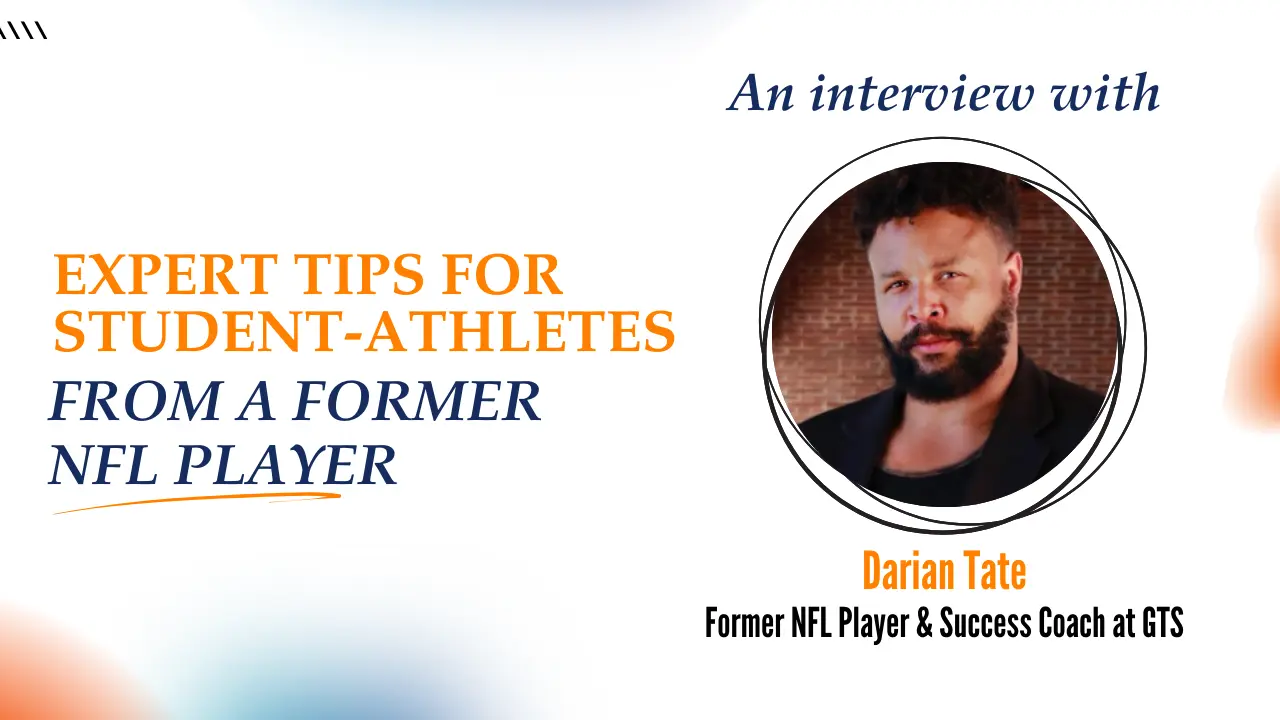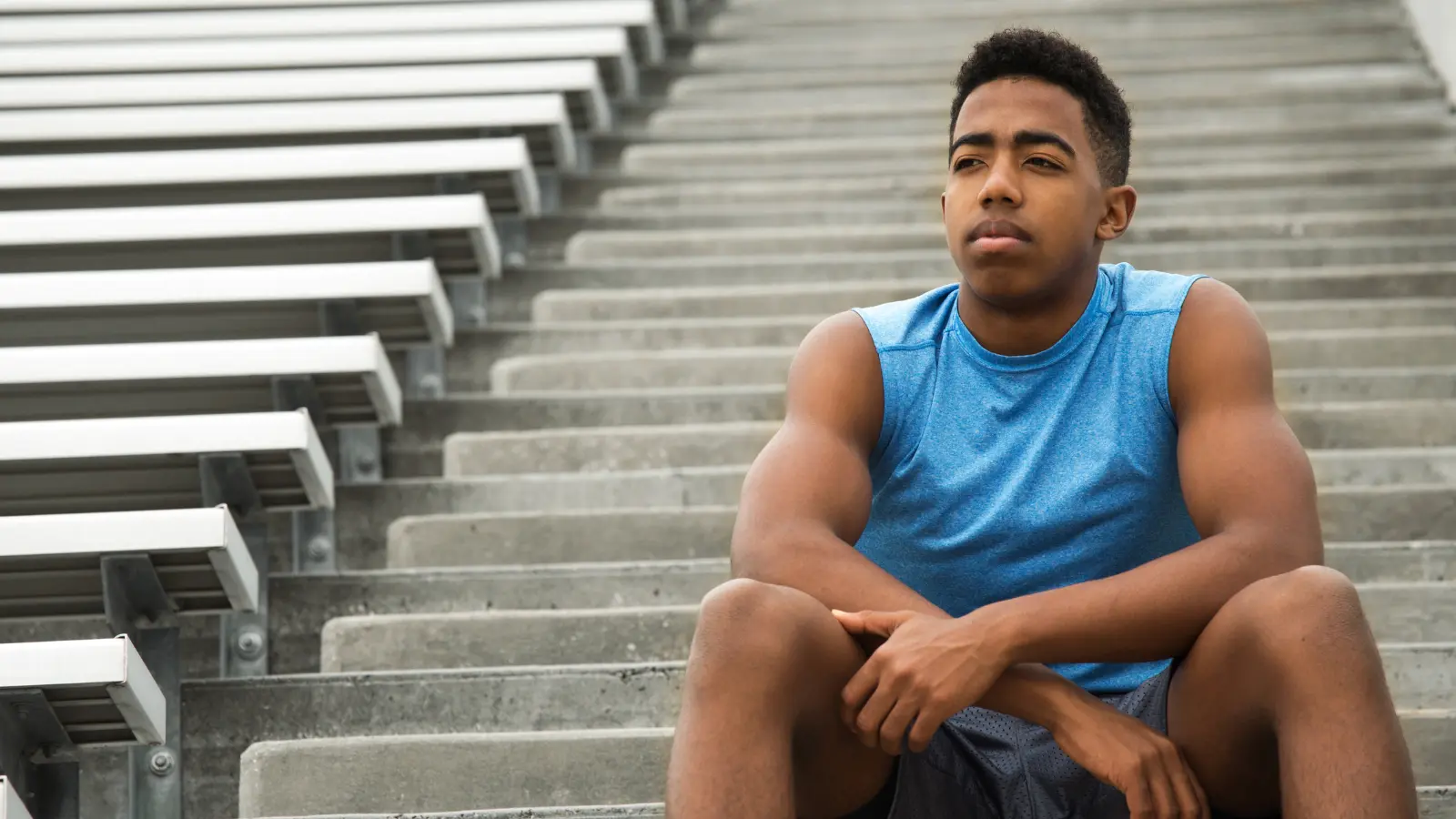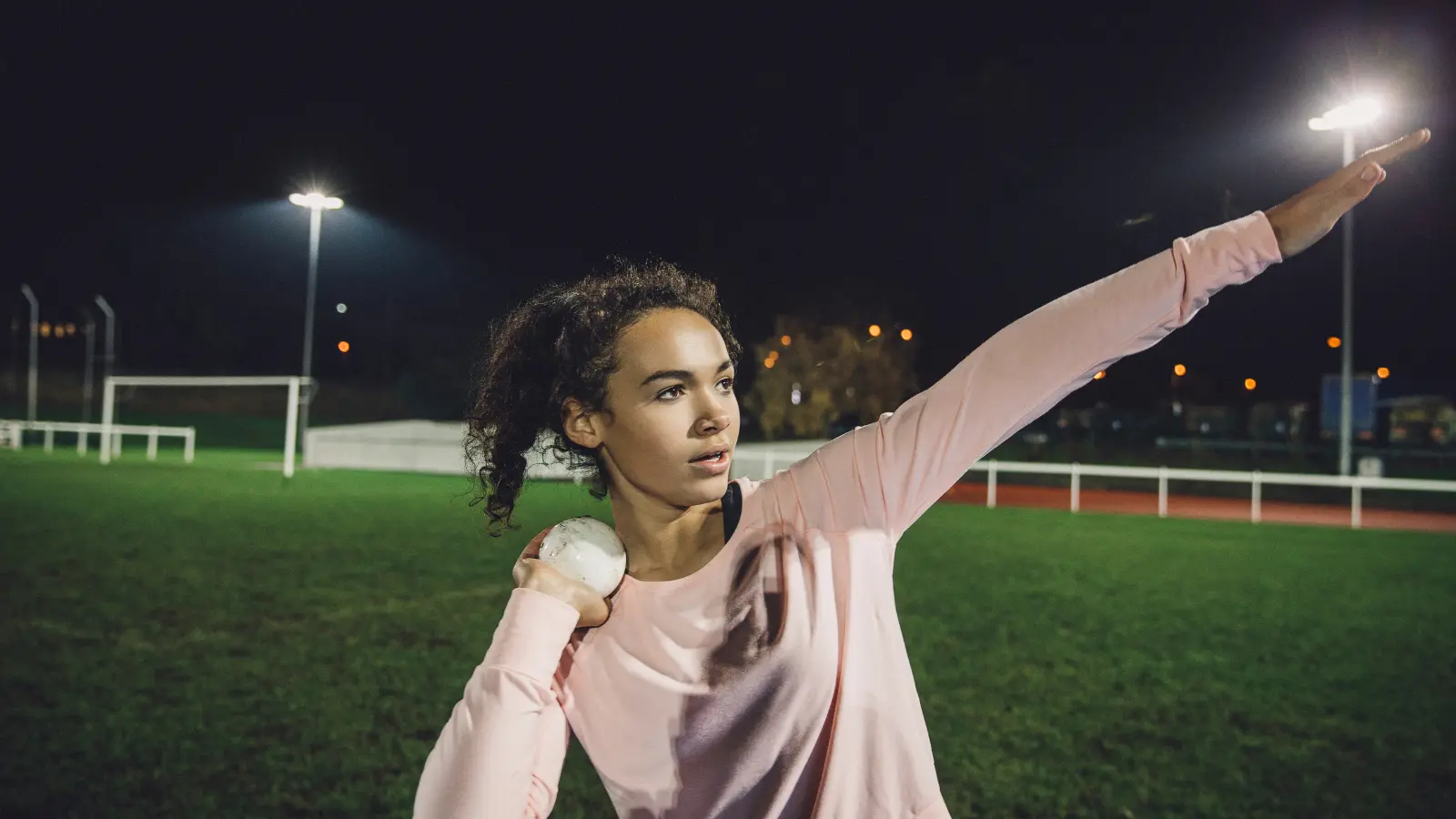We’re excited to share an insightful interview with Coach Darian Tate, a former NFL player, educator, and current doctoral student at the University of Southern California. In this interview, Coach Tate reflects on his journey from being a student-athlete to playing collegiate football and eventually joining the NFL. If you’re a high school student and looking for expert tips for high school athletes, keep reading.
The interview is conducted by Bedri Parlar, a remarkable student who has recently graduated as a high school valedictorian, played football throughout high school, and will be attending The Ohio State University on a full scholarship to study neuroscience.
Coach Darian Tate’s Journey: Early Beginnings and Inspiration to Play Football
Bedri Parlar: I played high school football, all four years as an offensive and defensive lineman, right guard, and nose tackle. And then, I stayed at right guard for my last two years.
I started football in middle school just to make friends and be active. But the more I played it, the more I loved it. Even the conditioning because I would go through all that with my brothers. And very rarely do you get to experience teamwork like that outside of football.
Playing football is a different feeling. Stepping out under the lights and playing next to your brothers, representing your school. I was very privileged to be able to play that sport. I love the game. I love being out there in the trenches.
From what I’ve read about you, Coach Tate and what I’ve heard about you from Doctor Ucan (Founder & CEO of Global Town School), I’m really excited about what you will share in this interview. As someone who has played the sport at a professional level, you probably played it longer than I’ve been alive. You have accomplished so much in your life.
Can you please introduce yourself and briefly describe your professional sports career, teaching, coaching, etc.? What are you doing now? How are you involved in Global Town School?
Coach Tate: Thank you, Bedri. I’m Darian Tate. I am an activist, humanitarian, educator, and athletic director who has partnered with and worked with non-profit organizations and public schools in the inner city.
I’ve also been a founding administrator and teacher for two charter schools, Chicago Math and Science Academy in Chicago and Horizon Science Academy, Belmont, also in Chicago.
After spending nearly a decade playing professional football and mentoring inner-city youths, I know what truly drives student-athletes and collegiate and professional athletes, particularly those from diverse backgrounds.
I am from Inglewood, Chicago, and through hard work, I was able to earn an athletic scholarship to attend Northern Illinois University. My perseverance landed me an NFL contract with the Carolina Panthers. Also, Barcelona Dragons, Berlin Thunder, and Amsterdam Admirals in NFL Europe. I would like to say that my relentless attitude and work ethic helped me capture a conference championship in college.
I was also able to capture a world championship while playing for the legendary Mike Dicta for the Chicago Rush Arena Football League team in 2006. In 2016, I was honored as a Wall of Fame student-athlete recipient at Walsh University in North Canton, Ohio.
My tenure in the military was very short, but I served two terms, and I did two deployments. And I do know the epitome of leadership, discipline, strength, integrity, perseverance, honor, and duty to country. I am a veteran former United States Army infantry rifle squad leader. I was a recipient of the many ribbons: Afghanistan campaign medals, army commendation medals, NATO medals, and the Covenant Combat infantry badge.
In addition to my extensive college and professional experience, I am currently studying for my Doctor of Education Program at the University of Southern California, which is in Los Angeles.
Bedri Parlar: That is very impressive. Let’s start from the very beginning. What made you start playing football?
Coach Tate: Everyone always asks me this question. I played multiple sports daily. When we were growing up, it was totally different from now, when you guys have a lot of luxury: computers, the internet, and social media.
I was always outside playing football, basketball, and baseball. I didn’t play organized football, actually, until I got to high school. I had a very talented and athletic older brother who was an awesome athlete. The coach asked him if he had any siblings that played sports.
His name was Coach Luisavito. He also actively recruited me out of 8th grade along with other coaches in Chicago public schools. I was a six feet 220-pound kid in 8th grade. So every substitute teacher that came to my school, if they were involved in coaching anywhere at different high schools, and they saw me, they were like, yes, I need this kid in my school.
So, I actively started getting recruited in elementary school, and I had no clue. I used to tell my mom that some coach wanted me to come to this high school, but in the long run, of course, I wanted to be next to my brother.
But it also, not only was it a great opportunity for me to go to a high school of my liking, but it also was an opportunity for me to kind of, like, pull myself up and, get out of that poverty level of education I was in Englewood. So, being able to get out of the neighborhood and go away to school, high school was just a great achievement for me, and it got me in the right mindset to achieve more and hit my long-term goals.
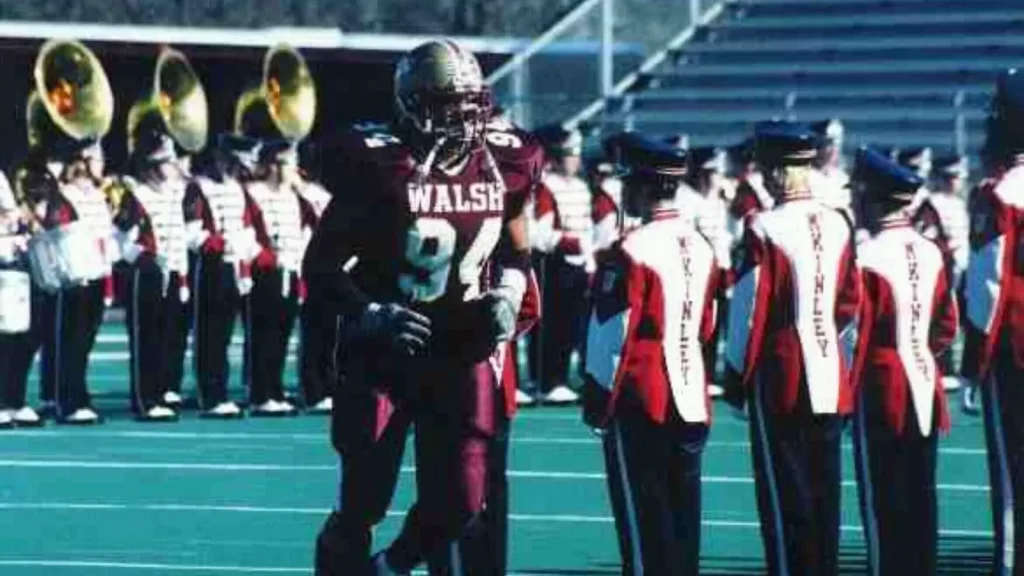
High-School Athlete Experience and Its Impact on Career
Bedri Parlar: Can you share your experiences as a high school athlete and how they shaped your career?
Coach Tate: As a high school athlete, it really helped give me structure and discipline. Before sports, I was getting into trouble. I was hanging around in the neighborhood. Of course, like I said, it’s all about area codes, and whatever area codes you’re in, that means you’re in that gang, in that area code.
That’s just the Chicago life. And, this was the best way for me truly to get away from that, to start pushing that kind of environment away from me, and start doing something actively that I liked that was positive. So I started to take sports very seriously, and I started studying more of course when you get into sports. They tell you, hey, you have to be disciplined. You have to maintain this GPA.
I started lifting weights more. I started burning the baby fat off. It also helped catapult me into the leader early in my high school career, like my high school and basketball and football, really helped me stay sharp academically all four years.
Because when you’re a student-athlete, you have expectations on you. And if you really have the long-term goals of being, say, someday of a collegiate athlete you have to maintain a certain GPA. Your grades need to be solid.
It also helped me develop empathy, and it helped me become a better teammate. I was very close to my high school teammates, and we still talk to this day.
So when I say empathy, it helps you to really develop not those superficial relationships where you see people and say hi. It really helps you dive into people’s lives. You really become family with your teammates.
Transitioning from High School to College: Challenges and Time Management
Bedri Parlar: What were the biggest challenges you faced when transitioning from high school to college sports, including time management and balancing your academic life?
Coach Tate: That’s a really great question, Bedri. Balancing time is so tough as a student-athlete. I’m gonna tell you honestly, I wasn’t as probably smart as you, but I know academically, I was not ready.
I do have a high level of self-efficacy, but I just don’t think I was ready. And it wasn’t easy to say that I wasn’t doing great or I wasn’t successful in terms of grades in high school. I don’t think I was just mentally mature enough to really be able to dissect the schedule and say, hey, I’m going to study this amount of time per day. I’m going to study now. I’m going to study later on. I couldn’t put my schedule together like that. And just the focus level wasn’t there. Also, the stress on your body from working out daily wears on you physically and mentally.
So, and one thing also, there’s never enough time. There’s never enough time to really study when you’re a college student-athlete. Because the coaches have so much of your time tied up, it’s so hard to really commit to studying unless it’s late at night. Throughout the morning and the day, afternoon, and evening, you’re pretty much sold up doing things.
But, currently, there are guidelines from the NCAA that dedicate a certain amount of hours for sports programs weekly. And this is the advantage that student-athletes have. Now, back when I played football, a coach could tell you, hey, we’re going to have a walkthrough on Wednesday at such and such time. And it could potentially be taken away from your study time.
So now what the NCAA has done is made sure that coaches really maintain integrity as how it relates to the hours that they can spend with you. So this is a good thing. I wish that was happening when I was in school. Maybe I could have stolen a couple more hours to study on a regular basis, but I could never get enough hours to do homework. Like, I found myself doing homework at, like, two, three, four in the morning every day.
College Recruitment Process and Getting Noticed by Coaches
Bedri Parlar: You were talking about how you were being scouted in middle school because you’re so big and all that.
So, what was it like with the college recruitment process when you were in high school? What should high school athletes focus on to get noticed?
Coach Tate: Well, the recruiting process was very strange when I was in school. Very strange as it relates to grades. GPA had to align with ACT scores and SAT scores. Now, like I said, some states don’t even require ACT or SAT. You can just have some recommendation letters and a really great GPA, and you’re good to go, especially in the state of Illinois.
But, I’m gonna tell you this. Even when it comes to recruiting and getting recruited, I think it’s pretty even out there. When I say even, I’m saying that every one of our generation had to actually go out there. Like, coaches had to travel to see us. Like the Big Ten coaches and the SEC coaches.
They had to travel to our games in Chicago. They had to come and see us physically in person. They watched us on film, but they wanted to come and see us in person, and they had that luxury to do that.
Now it’s different. Every student-athlete has a phone camera or camera. They have the internet, social media, and emails. Right now, in 2024, when I start mentoring recruits and their parents and talking to them, I say, on’t rely on coaches to call you. Use everything that you have access to. Cameras, the internet, and social media use all that. Use all those tools to market yourself, and you can email every single university across the US.
Those are the things that you need to do on a regular basis. Grades are important. As I said, the ACT or SAT is no longer a big make-or-break deal. Coaches are also vital to the recruiting process. When I say coaches, I’m talking about your position coach and your head coach at your high school.
The college recruiters usually ask those coaches character questions about you. What type of person are you? What type of leader are you? When you’re not on the football field, what are they doing? What are they like? So they ask very intrusive questions to really get a feel for you.
Before they bring you to their school, are you going to be there for four years? First of all, because they don’t want to waste $100,000 on a student-athlete that they’re going to have to kick out or get kicked out due to academic failure, they really want to find out all the information that they can from you before you come there.
But the recruiting process is marvelous once you get into it and set up your visits. When I was in school, you got five visits. I think you can make three official visits and two off-the-record visits. And it was amazing to travel to different schools and just get out there at their games and just walk on the field, go into the locker room, and go through the tunnels.
It’s an amazing experience. And I see more and more colleges making the experience more enjoyable.
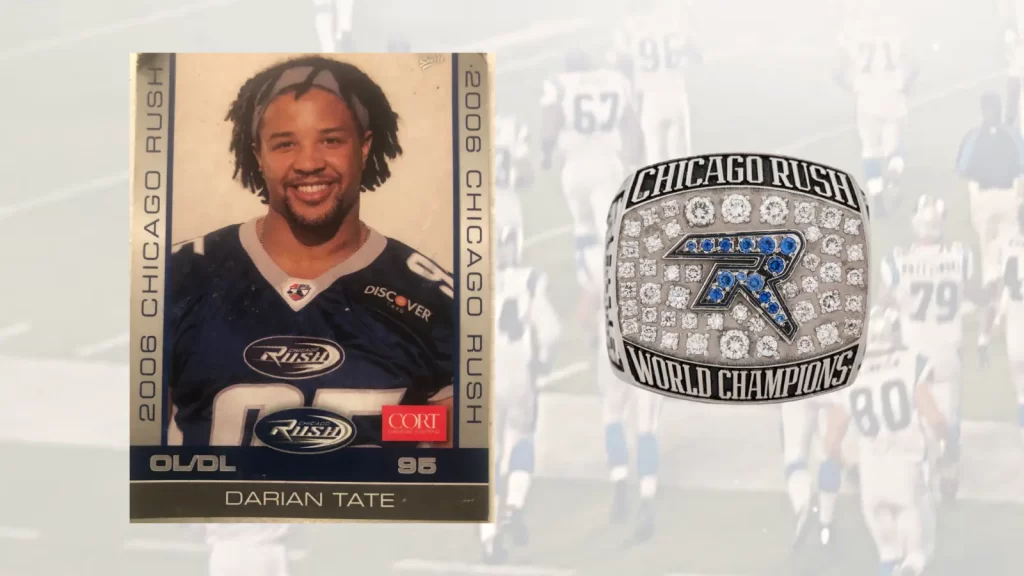
Daily Life as a College Athlete: Balancing Academics and Athletics
Bedri Parlar: What did a typical day look like for you as a college athlete? I know you said you were extremely busy. How did you balance your academics and athletics?
Coach Tate: A lot of the timehe recruiting process is amazing. But also, once you get out of that honeymoon stage, you go into your daily routine. Once you go to your university, oh my goodness, it is a daunting, daunting day. A lot of guys get washed out because of the daily routine.
They just can’t handle it. Not even because of academics. It’s because they can’t take the rhythm of the daily routine. So, I’ll give you just an example of what I did on a regular basis. So every single day,wake up at 5 in the morning.
That’s to get ready for a morning workout: resistance training and Olympic-style lifts with our strength and conditioning coach. After I was done, I barely had time for a shower. Most of the time, I would run out of there funky, throwing in a sweatsuit and go to your classes.
Student-athletes take two to three classes a day, which is 12 hours at minimum. If you were a lower-performing academic student, they’d suggest you only take 12 hours. For some of those higher-performing students, they’d suggest 15 to 18 hours.
So, once I was done with my classes, we went straight to team meetings. Team meetings typically last an hour. Then we’ll go to practice. 2 hours full padded practice. Once we’re done with practice, we will go to individual meetings and positional meetings. After we finish that, we finally get a chance to chill, relax for about ten minutes, 15 minutes, shower, and get something to eat. Then, we will head over to the study table.
You have to get at least 2 hours per night, or equivalent to 8 hours per week. And that study table, you would have tutors and different subject matter experts to come in there and help you. So that was great. But you see, what I’m saying is this schedule is very daunting.
And this is what we will repeat at least four days a week. So you’re repeating this Monday through Thursday if you get away again because you’re usually going to travel on Friday. If you’re at home, you’re going to do that Monday through Friday. So, it’s a tough schedule, and your daily routine can make or break you.
If you’re not used to monitoring and scheduling your time or being a routine person, it can really harm you. I saw it affect a lot of people’s abilities to get up in the mornings because their bodies just weren’t ready for it. They didn’t have that structure, maybe in high school, so once they got to that division 1 level, they just couldn’t handle that rough schedule every day.
Preparing for the Rigors of College Athletics
Bedri Parlar: What do you think high schoolers should do to prepare for that level of rigor and daily structure?
Coach Tate: I think that you have to have really disciplined coaches who give you a set schedule regularly. You can’t have a coach who has different schedules from week to week. As a coach I always made sure I kept the same schedule because I wanted my student-athletes to be able to know what they were doing every day so they could schedule around sports, like studying and things like that.
So you have to have a coach who helps you develop that scheduling skill, like athletics and academics.
Essential Skills and Qualities for Success at the College Level
Bedri Parlar: What specific skills or qualities do you believe high school athletes need to develop to succeed at their college level?
Coach Tate: I think having a positive mental attitude, I mean, everything will not be perfect. You have to stay in tunnel vision. Like, you have to keep tunnel vision on and, like, just be focused on your personal goals. For me, I became goal-oriented. I set small goals that were attainable.
As I advanced and improved, I set goals that were tougher and longer to achieve. But I set those goals knowing that I had time to complete them. I knew that by achieving those smaller goals, I would eventually hit my bigger goals.
So, just having a positive mental attitude is important because, in high school, everyone thinks they’re the man. It’s a different level. Everyone is competitive on the NCAA level. Everyone dreams of someday becoming a professional athlete or just wanting to be a really great college athlete.
In high school, you have maybe about 55 players on a team and maybe 15 to 20 dudes who are really talented. On the collegiate level, everyone is talented. So you’re going against guys who are equally as talented as you. As far as skill development, you just have to stay mentally strong. That’s the only thing about that.
Importance of Mental Toughness and Strategies for Success
Bedri Parlar: You were talking about your structure in college and how important mental toughness is not only in sports but also in your daily life. What strategies helped you? How important is mental toughness in college sports and what strategies helped you maintain focus and resilience?
Coach Tate: One of the particular strategies that I talk about with some of my athletes is visualization. I used to visualize before the games and before practices. I used to make sure I sat there and set time to visualize.
One of the things I would do is react or think about what my opponent would possibly do and also what I would do in a game situation to help me become a really great player or make really great plays. So that’s one of the best strategies you can use right there: visualization.
Influence of Coaches on Development and Success
Bedri Parlar: How did your coaches influence your development and success at different stages of your career?
Coach Tate: So, for different stages, I would say one of the things that I did to help me at different stages of my career is the physical abuse I took on my body. One of the things that I did in my career was really taking care of my body.
I always went to visit my personal trainer on a regular basis because I wanted to make sure that my body was able to withstand what I was going through weekly. So, every week, I would spend at least 10 hours in the training room to get the proper support for my body.
That was one of the biggest things I could do to be a great teammate because everyone was counting on me. When you’re playing football, and you’re an athlete, and you’re good at your position, everyone is counting on you every single week. So when you’re not healthy, you’re not helping your team, and that’s one of the biggest things about playing college sports.
So one of my things I always did was I wanted to make sure that my body was 100% every week. And that’s tough. Playing collegiate football up until I went to play professional sports in the NFL, I felt like my body was still hurting from playing professionally.
Diet, Training, and Maintaining Physical Health as an Athlete
Bedri Parlar: Did that include diet as well? Like, what did you eat?
Coach Tate: Playing high school and college, I literally lived off a diet of ramen noodles frosted flakes, and I wouldn’t suggest that to any student-athlete. ig universities have really great training programs where you can have that good diet and nutrition weekly. My school was just okay when it came to really giving us training tables.
When I talk about the training tables, the training tables give your student-athletes the necessities they need, the bare minimum. So, like, feeding them every day. Our sports program fed us once a day. So they would feed us for lunch, and that was it. We were on our own for breakfast and dinner.
So, I tell a lot of people that I didn’t have a lavish diet, but I made sure that I trained efficiently. Whenever I went to the gym, I trained with everything I had, 100%. So that would be the key to my success, is to train as efficiently as possible.
Get into the gym for your workouts. Lock into your workouts because. Honestly, when you’re a young kid, when you’re a young adult,, you don’t have to worry about nutrition. Your metabolism is so great. If you work out efficiently, you’re going to be good.
So I don’t tell student-athletes in high school and college, unless I see them visually being overweight, to be on a certain diet program.
Life Lessons Learned from Playing Sports and Advice for High School Athletes
Bedri Parlar: Okay. And then moving on. So, what are the most valuable life lessons you learned from playing sports at high levels, and how did you prepare for your life after sports during your athletic career?
Coach Tate: I talk about this all the time with my friends. The most valuable life lesson that I learned is not to take myself seriously. I’m only playing a sport that I love to do. I remember I was a sore loser.
I have the opportunity to continue playing this game. I love this game. I’ve played it respectfully. And that was one of my life lessons from playing at that high level in the NFL. One of the biggest lessons that I learned is to enjoy it while you can and have fun while you can because as you’re watching sports now, you can see it can be taken from you at any given play.
So a lot of guys would say, I can’t wait for the season to be over, and I’m sitting there like, I love this. I can do this all year round. And I enjoy playing football. It was so fun to me even when I got to the NFL level, I didn’t look at it as a job. Most guys. I was professional at my job, very professional. But I didn’t take it as a job.
I just said, this is what I love to do, and I’m getting paid to do it. As far as life lessons and collegiate level are concerned, my friends and I always talk about them. To this day, we say that sports, football particularly, has provided our families with numerous opportunities and provided that wealth for our family, that umbrella of wealth for our family to be able to buy homes, to be able to buy cars, to put food on the table.
All of my friends are doing so well, and I’m going to tell you, a lot of them did not play in the NFL. A lot of the guys said, hey, I’m done. After college, they didn’t get recruited to play in the NFL, and they have really great jobs. But that was because, as we talked about earlier, they were students first and athletes second, and they made a career.
So everyone I know, all of my buddies, are doing so good, they’re so successful, and guess what? It’s because they all had the opportunity to go to college on a full scholarship and play football, something that they love to do.
Bedri Parlar: What is your top advice for high school athletes who aspire to play at higher levels, including aspects like leadership, teamwork, goal setting, and overcoming adversity?
Coach Tate: My top advice would be to follow your dreams. Follow your dreams even when people are telling you it’s not possible. Because all of my life, people have told me, hey, you’re not gonna be able to do that. You’re not gonna get a scholarship. You’re not good enough.
And I didn’t really think about it then, but all that stuff played in my mind as I was playing collegiate football and playing in the NFL. I just think about the times that my teachers didn’t believe in me and say, you’re not gonna be good.
Because I was a troubled kid in school or in the lower grades and in 5th, 6th, 7th grade. Sometimes teachers say mean things to their students and they don’t know the long term effects that it may have on them.So follow your dreams. No matter what anyone says to you, sometimes it’s your family members who look and laugh at you.
Bedri Parlar: One last question. How a school, like Global Town School, would have helped you if you had that option back then? Think about yourself. If you had the chance to attend an online school and have the flexibility to have the personalization that we provide.
How do you think that would have helped you?
Coach Tate: Well, number one, I love what Global Town School is all about. And I think that if I had had a Global Town School when I was a student-athlete in high school, I think this would allow me to be academically ready. Like I said, my academic level didn’t match my self-efficacy because I didn’t feel like once I got to college, I didn’t think I was ready.
But I feel like if I had had Global Town School, and I could have had that one-on-one mentorship by our coaches at Global Town School, I would have been ready. Also, it would have given me the ability to have a structured educational program that I can do on a daily basis while I’m still getting better at whatever craft that I love to do every day, whether it’s being an artist, a pianist, or an athlete.
Having that flexibility and the option to attend online schools and also put in work for what I love to do in terms of what I’m trying to do and be successful in the future. I think this would have been awesome. This would have been magnificent for the development of me because it would allow me, that individual program to really help me succeed.
Also, I would have had someone, a mentor, to really help me set my long-term and short-term goals and check the box once I attain them. So, this would have been the perfect plan for me. Global Town School would have been perfect for me when I was in high school.
Bedri Parlar: Well, thanks. I appreciate Coach Tate for such a great interview. I appreciate it.
Coach Tate: Thank you, Bedri, for your great questions.
Watch for more expert tips for high school athletes
You can also watch the full interview on YouTube to learn more about some expert tips for high school athletes.
